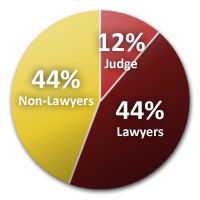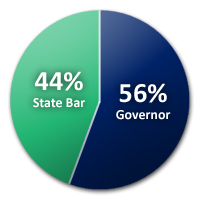Author: Richard Duncan
| State High Court & Judicial Nominating Commission | Composition & Terms of Judicial Nominating Commission | Judicial Selection Process | Legal Authority |
|---|---|---|---|
*No more than 4 of the voting members may be of the same political party Terms: 4 years (staggered) |
General
Interim Vacancies
|

Percentage of Lawyers on the Nominating Commission

Who Selects the Nominating Commissioners?
Latest News
- Nebraska Supreme Court upholds law restricting both medical care for transgender youth and abortion - Jackson Hole News&Guide
- Nebraska Supreme Court upholds anti-trans care, anti-abortion law - Advocate.com
- Nebraska Supreme Court upholds gender-affirming care, abortion as single subject - WOWT
- Nebraska Supreme Court Upholds Abortion, Gender-Affirming Care Ban - KLIN
- Nebraska Supreme Court upholds law restricting abortion and banning gender-affirming care to minors - Courthouse News Service
- Nebraska Supreme Court upholds restrictions on abortion and gender affirming care - USA TODAY
- Nebraska Supreme Court affirms law restricting abortion, gender health care for minors - Nebraska Public Media | News
- Nebraska Supreme Court upholds abortion restrictions, ban on sex changes for minors - Catholic News Agency
- Nebraska Supreme Court upholds state’s 12-week abortion ban and transgender care restrictions - KSNB
- Nebraska Supreme Court upholds state’s 12-week abortion ban and transgender care restrictions - KOLN
Scholarship & White Papers
-
Keystone XL in the Nebraska Supreme Court
Environmental Law & Property Rights Practice Group Podcast, January 29, 2015
Featuring Katie Spohn, J. Tyler Ward
Media & Commentary
-
Nebraska High Court Applies Common Law Doctrine of In Loco Parentis to Confer Standing on Former Same-Sex Domestic Partner in Child Custody Dispute
With the use of surrogates, in-vitro fertilization, adoption, and egg and sperm donation, same-sex couples are increasingly able to have children. However, when these relationships sour, separation and divorce of gay and lesbian couples gives rise to complex issues of child custody and visitation. In Latham v. Schwerdtfeger,1 the Nebraska Supreme Court was faced with the issue of whether the doctrine of in loco parentis granted a former same-sex domestic partner standing to sue for child custody and visitation for her non-biological child. Nebraska, like most states, does not have specific statutes to address same-sex couple unions, dissolution of marriage, and child custody disputes. Courts therefore turn to common law principles to fashion a remedy when such disputes arise.


 Nebraska Supreme Court
Nebraska Supreme Court